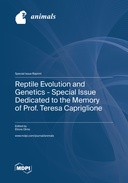Explore

Reptile Evolution and Genetics - Special Issue Dedicated to the Memory of Prof. Teresa Capriglione
Ettore Olmo (editor)
2023
0 Ungluers have
Faved this Work
Login to Fave
This Special Issue contains 12 articles evidencing the state of the art of research on the evolution and genetics of reptiles. One of the main lines of research concerns the advancements in phylogenetic studies based on the more recent molecular methods and the developments in whole genome sequencing. Among the papers, topics related to the analysis of genome composition with special reference to the presence and evolution of repetitive DNA and the control of gene activity are of interest. Examples of the different roles played by chromosome variability in various evolutionary models are reported. Some of the papers regard certain peculiarities of reptiles, such as meiotic mechanisms in parthenogenetic species and the transition between genetic and environmental sex determination. Besides studies on chromosomes and the nuclear genome, two papers also investigate mitochondrial genome evolution. Particularly promising for future studies is the potentiality gained by the results obtained so far from research into the evolution and genetics of reptiles that has also been used for an intriguing tentative motion to reconstruct dinosaurs’ karyotypes. The papers from this Special Issue highlight that reptiles are a good model for studying the genetic and molecular basis of certain key moments in vertebrate evolution.
This book is included in DOAB.
Why read this book? Have your say.
You must be logged in to comment.
Rights Information
Are you the author or publisher of this work? If so, you can claim it as yours by registering as an Unglue.it rights holder.Downloads
This work has been downloaded 120 times via unglue.it ebook links.
- 120 - pdf (CC BY) at Unglue.it.
Keywords
- anonymous loci
- antimicrobial activity
- bimodal karyotype
- Biology, Life Sciences
- Birds
- bisulfite conversion of immunoprecipitated DNA MeDIP-BS-seq
- cathelicidins
- centric fissions
- centromere
- chiasma
- chromosome
- chromosome rearrangements
- Colubridae
- Comparative genomics
- conservation ecology
- control region
- crossing-over
- cytochrome b
- cytogenomics
- defensins
- Dinosaurs
- epigenetic DNA methylation
- Evolution
- form and subspeciation
- GC content
- Genes
- Genetics
- genome evolution
- Genome Size
- gonadal differentiation
- haplotype
- heterochromatin
- incubation temperature
- isochores
- karyotype
- lizard
- Lizards
- Madagascar
- Mathematics & science
- Meiosis
- methylation-sensitive ELISA
- methylation-sensitive PCR
- methylation-sensitive restriction enzyme
- microchromosomes
- multiple sex chromosomes
- n/a
- Natural history
- NOR
- NORs
- nucleolar organizer
- ortholog
- paralog
- Peninsular Malaysia
- Peptides
- phylogenetic tree
- population cytogenetics
- Population diversity
- prophase I of meiosis
- rattlesnakes
- recombination rate
- reduced representation
- Reference, information & interdisciplinary subjects
- repetitive DNA
- repetitive elements
- Reptiles
- Research & information: general
- Serpentes
- Sex Chromosomes
- sex determination
- sex determination and chromosomes
- sexing diagnosis
- snake immunity
- snake toxins
- snake venoms
- somatic versus gonadal tissue
- Southern River Terrapin
- speciation
- synaptonemal complex
- synaptonemal complex (SC)
- target capture
- temperature-dependent sex determination—TSD
- ultraconserved elements
- varanid
- vertebrate reptilian turtle
- Viperidae
- Zootoca vivipara
Links
DOI: 10.3390/books978-3-0365-8171-2Editions

